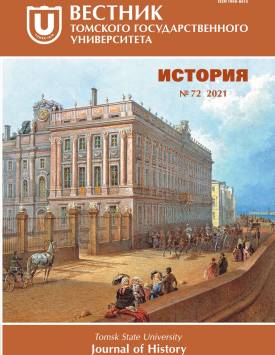The influence of regional ethnic public associations on the political system of national republics (examples of the Republic of Altai and the Republic of Khakassia)
The collapse of the Soviet Union, and furhter rejection of the mental attitudes that dominated the territory of the state for the last seventy years, led to an identity crisis in all post-Soviet republics. In the early and mid-90s, the aggravation of the national question, especially in the national republics of the Russian Federation, became an accelerator for the emergence of various ethnic public associations. Such associations, in turn, with the help of representatives of the local ethnic intelligentsia, grew into national movements (kurultai, khurals or congresses, etc.). These organizations, in the mid-90s, became significant players in the political field of the national republics. The problem of national identity has not yet been resolved, and therefore, attention is being paid to national organizations that influence the regional political process. In this regard, authors analyze social movements of an ethnic character in regions with similar processes of formation and development of a new political system. The object of the study is regional ethnic public associations of the national republics. The subject of the research is the process of formation and development of such associations. The aim of the work is the definition of general and specific features of the formation of regional ethnic public associations in the national republics. For a full and comprehensive disclosure of the topic, in the paper were used both general scientific and special historical methods. The main research method is comparative analysis. Authors compared the formation and development of two organizations: the Congress of the Khakass people and the Kurultai of the Altai people. The basis of the source base is made up of federal and regional legal acts, documents regulating the activities of ethnic organizations (charters). Also periodicals and archival documents had become an especially important source. In conclusion, authors infer: the stages of development of organizations took place in different ways. During its inception, the Congress exerted a significant influence on the political system of the region, in some moments, even being in opposition to the current regional government, achieved certain results, which, of course, formed a new political situation in the region. But gradually, participation in the political process finally faded away. Unlike the Congress "Kurultai of the Altai people" has been achieving its goals throughout its existence. It’s still an active participant of regional political process. Even the crisis phenomena can be assessed as a reaction to the political agenda of the region.
Keywords
national identity, social movements, regional political process, Republic of Altai, Republic of KhakassiaAuthors
| Name | Organization | |
| Lykova Alyona A. | Tomsk State University | alena.lykova.1995@mail.ru |
| Skorobogach Nikita I. | Tomsk State University | skorobogach_nikita@mail.ru |
References

The influence of regional ethnic public associations on the political system of national republics (examples of the Republic of Altai and the Republic of Khakassia) | Tomsk State University Journal of History. 2021. № 72. DOI: 10.17223/19988613/72/24
